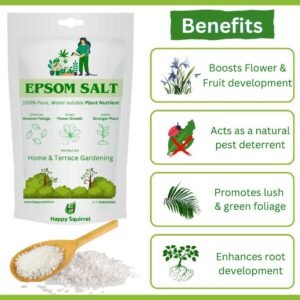- by happysquirrel
- September 24, 2024
- Gardening, Plant Growth Boosters
Epsom Salt Overview
Are you looking for a natural and affordable way to boost your plants’ growth and health? Look no further than Epsom salt for Plants. This can be a game-changer for your garden.
So, let’s dive in and discover why Epsom salt should be a must-have in every gardener’s toolkit. In this post, we’ll delve into the seven key reasons why Epsom salt should be a staple in your gardening routine. We’ll discuss how to use it effectively, as well as precautions to take to ensure optimal results.
What is Epsom Salt?
Epsom salt, scientifically known as magnesium sulfate, is a natural mineral compound that can provide essential nutrients to your plants. It’s a rich source of magnesium, a vital element for plant growth and health. Additionally, Epsom salt can also offer other benefits, such as improving seed germination, enhancing flower production, and reducing stress on plants.
Benefits of Epsom Salt for Plants
Epsom salt offers a surprising array of benefits for your garden. Let’s delve into the reasons why this unassuming mineral compound should be a staple in your plant care routine.
Nutrient Boost
Magnesium: A vital element for chlorophyll production, magnesium is essential for photosynthesis. Epsom salt provides a readily available source of this nutrient, ensuring your plants have the energy they need to grow and thrive.
Sulfur: Another essential nutrient, sulfur plays a crucial role in protein synthesis and enzyme activity. Epsom salt can help to prevent sulfur deficiencies, which can lead to stunted growth and yellowing leaves.
Improved Seed Germination
By creating a more favorable environment for seed germination, Epsom salt can significantly boost your success rate. Its ability to improve water retention and provide essential nutrients helps seedlings get off to a strong start.
Enhanced Flower Production
If you’re looking to cultivate vibrant and abundant blooms, Epsom salt for Plants can be a game-changer. By supplying the necessary nutrients, it encourages healthy flower development and prolongs their lifespan.
Stress Relief
Plants, just like humans, can experience stress. Whether it’s due to drought, extreme temperatures, or pests, Magnesium Sulphate can help plants cope with these challenges. By improving root health and overall plant vitality, it can enhance their resilience.
Pest Control
It acts as a natural deterrent for certain pests, particularly aphids and mealybugs. By creating an unfavorable environment, it can help reduce their populations.
Soil Health
Epsom salt for Plants can contribute to healthier soil by improving its structure and drainage. This, in turn, allows for better nutrient absorption and root growth.
Boosted Root Growth
Strong and healthy roots are essential for a thriving plant. Epsom salt for plants can promote root development by providing the necessary nutrients and creating a favorable environment for growth.
By incorporating Epsom salt for Plants into your gardening routine, you can reap these benefits and enjoy healthier, more vibrant plants.
How to Use Epsom Salt for Plants?
Not all plants require the same amount of Epsom salt. Some may be more susceptible to magnesium deficiencies, while others may have specific nutrient needs. Consider factors like the type of plant, soil composition, and overall plant health when deciding on the appropriate dosage.
Application Methods
Soil Application:
- Direct Application: For established plants, sprinkle Epsom salt directly around the base of the plant. Avoid applying it to the leaves, as it can cause burns.
- Mixing with Soil: When planting new seedlings, mix Epsom salt into the potting mix or garden soil. A general guideline is 1 tablespoon per gallon of soil.
- Watering: After applying Epsom salt for Plants, water the plant thoroughly to help the salt dissolve and reach the roots.
Foliar Spray:
- Solution Preparation: Create a diluted solution by mixing 1 tablespoon of Epsom salt per gallon of warm water.
- Application: Spray the solution on the leaves and stems of your plants, ensuring even coverage. Avoid spraying on a sunny day, as the water droplets can magnify sunlight and burn the leaves.
Seed Soaking:
- Soaking Solution: Prepare a solution by dissolving 1 teaspoon of Epsom salt per gallon of warm water.
- Soaking: Soak your seeds in this solution for 12-24 hours before planting. This can help improve germination rates.
Dosage and Frequency
The appropriate dosage and frequency of Epsom salt for plants application will depend on several factors, including the plant’s needs and soil conditions. As a general guideline:
- Established Plants: Apply 1-2 tablespoons of Epsom salt per plant every 4-6 weeks during the growing season.
- Seedlings: Mix 1 tablespoon of Epsom salt per gallon of soil when planting seedlings.
- Fertilizer: If using a balanced fertilizer, you may not need to supplement with Epsom salt, as most fertilizers contain magnesium.
Precautions and Considerations
- Overapplication: Avoid excessive use of Epsom salt for Plants, as it can lead to salt buildup in the soil, which can harm plants.
- Soil Testing: If you’re unsure about your soil’s magnesium content, consider getting it tested to determine the appropriate dosage.
- Plant Compatibility: While Epsom salt is beneficial for many plants, some may be more sensitive to it. It’s always a good idea to research the specific needs of your plants.
By following these guidelines and considering your plant’s unique requirements, you can effectively use Epsom salt to boost your plants’ growth and health.
